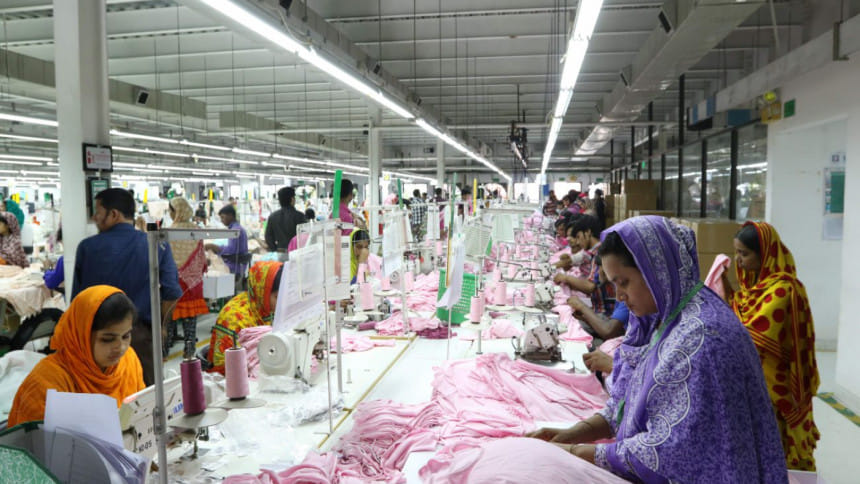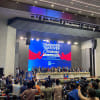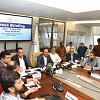Rights makeover overdue in Bangladesh garment industry

Time will tell whether Bangladesh's garment industry has its Wonder Woman. Last month, the Bangladesh Garment Manufacturers and Exporters Association (BGMEA) elected its first female president: Rubana Huq, managing director of the Mohammadi Group. In the lead-up to the elections, Huq pledged that if elected, "rebuilding the image" of the garment industry would be her top priority.
The Bangladesh garment industry needs a makeover, no doubt. Huq appears well-placed to spearhead reforms. To do so successfully, she needs to fix several of the industry association's missteps and firmly embrace workers' rights.
Huq promised to make Bangladesh famous for being "competitive" rather than the "cheapest." In this mission, she will not find better allies than labour advocates and workers. Brands, suppliers, and labour groups—and in fact, everyone—should unite to reject the notion that cheap equals competitive.
A growing number of rights groups, including Human Rights Watch, have publicly called out the duplicity of many global brands that say they support workers' rights but then drive down manufacturing prices without factoring in labour and social compliance costs. This practice thrives in environments where brands and suppliers do not need to accurately account for these expenses.
By treating labour costs as negotiable, global brands drive abusive cost-cutting measures that hurt workers and expose the brand to greater human rights risks in its supply chain. According to a 2016 International Labour Organization survey, the highest number of suppliers who felt compelled to accept orders below production costs came from Bangladesh. This directly affects workers' wages and other working conditions.
In 2016 and 2018, workers carried out two massive wildcat strikes protesting for better wages. Bangladesh authorities brutally suppressed these protests using excessive force, and brought fabricated criminal cases against those who weren't even at the protests. Thousands of poor Bangladeshi workers, mostly women, found themselves fired or blacklisted by factories for participating in protests.
We need to break this cycle of worker despair, government repression, and factory outbursts against protesting workers. But this requires two measures—first, trust-building, and second, a solution that combines innovative collaboration with technical know-how.
Winning workers' trust and seeing them as partners is important for the garment industry's stability. Huq should call on all garment factories to reinstate workers they fired without following fair procedures after the December 2018 protests, and compensate those who choose not to return. She should also publicly urge all garment factory owners or managers who brought criminal complaints against protesting workers to seek out-of-court settlements wherever possible.
If Huq really wants to make Bangladesh famous for being "competitive," not the "cheapest," here are some thoughts.
Huq's vision for collaboration among smaller suppliers is important. She should champion other transformative collaboration that can bring about deeper rights reforms. This entails harnessing the combined force of initiatives that seek to fairly calculate labour costs, improve fire and building safety, freedom of association, and transparency. These include the legally binding Bangladesh Accord on Fire and Building Safety that includes brand responsibility to facilitate financing for fixing fire and building safety problems; Fair Wear Foundation's (FWF) labour costing tools; Better Buying's anonymous supplier ranking survey; Brac's transparent factory mapping exercise; Wage Indicator's transparent reporting of workers' wages; and the ACT initiative's efforts to begin working in Bangladesh.
Huq should leverage Accord brands' responsibility to facilitate financing for remediation and promote the use of costing tools like those developed by Fair Wear Foundation. The FWF's labour costing tools allow manufacturers to accurately calculate wages and benefits and present it to brands. She should encourage all suppliers, including the ones where workers protested in 2016 and 2018 and those producing for Accord brands, to use FWF's Bangladesh costing tool.
Using such costing tools for Accord suppliers would be an important move toward ensuring that brands that say they are committed to workers' safety, freedom of association, and collective bargaining actually pay for these protections.
Huq may consider initiating proposals for a new initiative like the Gajimu project in Indonesia, which interviews workers off-site and gathers factory information about wages and publicly reports on them. This would allow everyone to see whether these costing tools are having demonstrable impact on workers' wages.
All global brands sourcing from Bangladesh should partner with Better Buying, a new index for brand purchasing practices, inviting suppliers to rank their business practices anonymously. Human Rights Watch has called for all brands to at least summarise the scores they receive from Better Buying, indicating to consumers whether their practices are average, below, or above average.
Huq could encourage expanding the details included in a map of factories created by Brac, an international development organisation. These include indicating which factories are using tools to accurately assess labour costs; provide factory-wise wage information determined by a Gajimu-like project; and show which factories have democratically elected unions and collective bargaining agreements.
These efforts will help set the stage for the Action Collaboration and Transformation initiative, which seeks to combine collective brand reform on purchasing practices with industry-wide collective bargaining agreements in Bangladesh.
Huq has at her disposal many tools to reshape Bangladesh's garment industry. She should use them to firmly advance workers' rights.
Aruna Kashyap is a senior counsel for the women's rights division at Human Rights Watch.

 For all latest news, follow The Daily Star's Google News channel.
For all latest news, follow The Daily Star's Google News channel. 








Comments